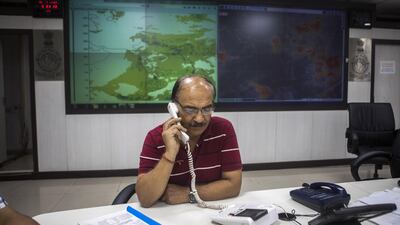There’s no doubt the internet is one of mankind’s greatest inventions - we all know it, there’s no dispute.
The domain name system that goes along with it, however, doesn’t get nearly as much credit – and it should.
Think about it. Without domain names – the common words and phrases that identify websites – we’d have to remember complex numerical sequences, otherwise known as internet protocol addresses, for every page online.
Rather than typing in Google.com, we’d have to enter 172.217.2.100 into our browsers, or 185.5.251.91 instead of TheNational.ae. The internet, or at least the Web, would be unusable if that were the case.
The engineers working on the ARPAnet, the US military’s precursor to the internet, quickly saw this inherent problem and helped establish the domain name system in the 1980s to solve it. They correctly concluded that mapping words to IP addresses would make it easier to find and remember locations online. It’s safe to say there would have been no Web if they hadn’t.
And yet, similarly unwieldy systems of numerical sequences still persist in the offline world in the form of physical addresses and phone numbers.
If you want to send a handwritten letter to someone, for example, you need to know their street and home number as well as their postal code. (The UAE doesn’t have postal codes, fortunately, so you can leave that part out here.)
Meanwhile, you’ll need someone’s specific digits if you want to call them, at least initially. Phoning another country is even more complicated, with several more codes entering the equation.
Technology has made it easier to find and remember home addresses and phone numbers, but it’s surprising nevertheless that we’re still using these anachronisms in the first place. They’re nowhere near as user friendly as the domain name system.
Telephone communications ironically started out as the inverse of that system.
_______________
Read more:
High iPhone prices can’t last forever
Erosion of net neutrality could jeopardise Web
_______________
When phones were first made available in the United States in the late 19th century, the relatively small network was staffed by operators who manually connected users.
If you had a phone, you called the operator and asked to speak to “Joe Smith”. Since there weren’t many “Joe Smiths” with phones, the operator probably knew who you were looking for and connected you.
The problems, of course, became apparent as the volume of users grew.
As the author John Brooks explained in his 1967 book Telephone: The First Hundred Years, one of the first large-scale deployment of phone numbers took place in Lowell, Massachusetts in the early 1880s following an outbreak of measles.
Fearful that the town’s four telephone operators would succumb and render the system inert, officials decided to shift to numerical identifiers for users, which would be easier to teach to substitute operators in the event of an emergency. The shift from personal identification to the numbers we know today went into full effect everywhere after that.
Decades later, voice over internet protocol services such as Skype and smartphone apps such as Google Hangouts have done much to obviate the need to remember randomised phone numbers, but the old system still floats under the surface.
For example, if you are in the United Kingdom, say, and you want to Skype a non-Skype user you’ll still need their number to make initial contact.
Fortunately, additional advances will help.
Voice over Long Term Evolution, or VoLTE, is an emergent wireless technology that essentially converts all cellphone calls into data.
VoLTE delivers better audio quality, but it could also finally liberate us from numbers. Just as the same Skype address follows a user from desktop to mobile, so too will a VoLTE connection. Wireless carriers around the world, including in the UAE, are now rolling it out.
With luck, we’ll soon be able to find or create contacts simply via their actual names, no numbers needed.
The concept of physical addresses is being shaken up, too, particularly in developing countries where streets may not have names and homes don’t necessarily have numbers.
Some efforts are using satellite coordinates to navigate to and through such places, but a more intriguing option comes from What 3 Words.
The London-based company has divided the entire world into 57 trillion squares measuring three by three metres. Each square has a unique three-word identifying address applied to it.
The Burj Khalifa, for example, is reports.petted.select, while the Sheikh Zayed Grand Mosque is deal.loose.evolved. The thinking, backed by scientific study, is that people find it much easier to remember a three-word phrase than a complex numerical code.
It’s not a perfect concept since it’s obviously possible to have multiple homes in a single three-word zone, but it’s a good start – especially in underdeveloped areas. Indeed, the postal services of Ivory Coast, Mongolia and several other developing countries are using What 3 Words as their official addressing system.
Will such a system ever catch on in the developed world?
Who knows, but one thing is for sure – a good portion of the world is already discovering better ways of identifying people and places than with numbers no one can remember.
It’s about time we all got on board with such efforts.

